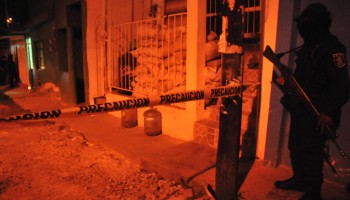Twelve were killed in attacks at six bars, a man and a 14-year-old boy were shot in their car, and another man was killed in a fight between rival gangs after leaving a private party.
Police have not made any arrests yet and they are not sure if the incidents were linked.
Six of the victims were killed at the Rancho Viejo restaurant and bar. The prosecutor’s office has attributed the shooting to organized crime.
The attacks came just two days after the transition team of Mexican President-elect Andres Manuel Lopez Obrador’s incoming government announced a plan to reduce crime in the country, which includes offering amnesty for certain drug war crimes, Reuters reported.
The plan, which they dubbed “transitional justice,” aims to create more lenient policies.
For example, it proposes reducing jail time and forming truth commissions to investigate disappearances and extrajudicial killings. The government also promises to grant reparations for victims, focus on the causes of poverty, and work to get kids out of areas with drugs by providing scholarships.
“It’s an integrated public policy,” Olga Sanchez, Lopez Obrador’s proposed interior minister, told Reuters, explaining that the goal is to “pacify the nation.”
The amnesty program will be focusing on individuals from vulnerable social groups such as youth and rural farmers. The New Republic points to two studies that reveal how such groups are targeted more than others by organized crime.
The first was conducted by the Mexican Senate in 2012 and found that eight out of ten federal prisoners for drug crimes had not finished high school. The second, by Mexican NGO, Equis, showed that the number of women prosecuted for drug crimes had doubled between 2015 and 2017.
In an attempt to distinguish highly violent criminals from impressionable youth, only individuals who are willing to go through a rehabilitation process and attend sessions with victims can take part in the amnesty program. Murderers and torturers will not be allowed to participate.
This new approach is a response to the steadily increasing rates of murder, kidnappings, and forced disappearances in Mexico since the war on drug-trafficking began in 2006 under then president, Felipe Calderon.
The homicide rate has been rising since 2015, with 2,948 murders in May 2018, according to monthly data collection from the Secretariado Ejecutivo del Sistema Nacional de Seguridad Publica and collated by Mexico Crime Report.
In most of Monterrey, reported homicides increased by between 1.9 percent and 57 percent between 2016 and 2017, depending on the district, according to the US Bureau of Diplomatic Security Mexico Crime and Safety Report 2018.
The military, which was deployed to patrol the streets under Calderon, has only added to the violence. In 2017, Human Rights Watch had received almost 10,000 complaints of abuse by the army since 2006.
Lopez Obrador’s proposal seeks to remove a significant portion of the military from patrolling the streets and put resources into professionalizing the local police.
The new administration will also form an office of the Sub-Secretary of Transitional Justice, Human Rights, and Attention to Victims, to conduct the truth commissions and then pass on information to federal and state prosecutors, according to The New Republic. There will then be an independent federal prosecutor that is not linked to the executive branch and therefore can make decisions free from political biases.
This “transitional justice” style of governance has already been used in Colombia and Guatemala. In Colombia, the program enrolls former FARC members in educational and rehabilitation programs that allow them to reintegrate into civilian life and it seems to have been successful.
The New Republic points to a former militant with the M-19 guerrilla organization who ran in the Progressive Movement party in Colombia’s recent presidential election. He came in second place, suggesting that the general public is open to allowing these individuals back into the community.






